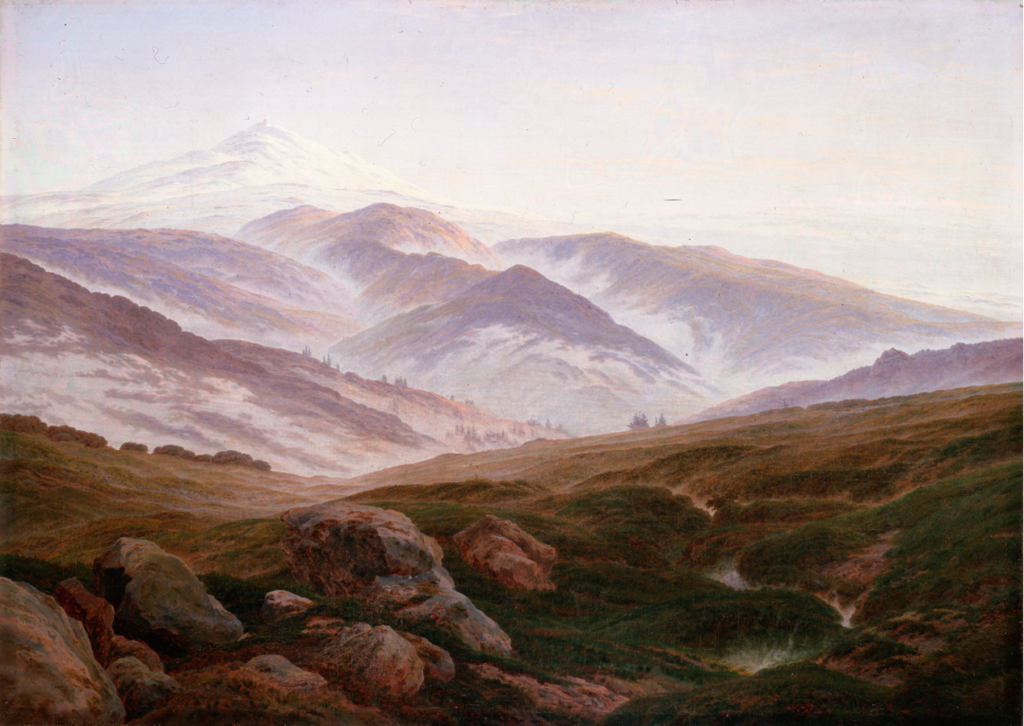On the giant peak
(Poet's title: Auf der Riesenkoppe)
Set by Schubert:
D 611
[March 1818]
Hoch auf dem Gipfel
Deiner Gebirge
Steh ich und staun’ ich,
Glühend begeistert,
Heilige Koppe,
Himmelsanstürmerin!
Weit in die Ferne
Schweifen die trunknen,
Freudigen Blicke,
Überall Leben,
Üppiges Streben,
Überall Sonnenschein.
Blühende Fluren,
Schimmernde Städte,
Dreier Könige
Glückliche Länder
Schau ich begeistert,
Schau ich mit hoher,
Mit inniger Lust.
Auch meines Vaterlands
Gränze erblick ich,
Wo mich das Leben
Freundlich begrüßte,
Wo mich der Liebe
Heilige Sehnsucht
Glühend ergriff.
Sei mir gesegnet
Hier in der Ferne,
Liebliche Heimat!
Sei mir gesegnet,
Land meiner Träume,
Kreis meiner Lieben,
Sei mir gegrüßt.
High on the summit
Of your mountain range
I stand in astonishment,
Glowingly thrilled,
Sacred peak,
Breacher of the skies!
Far into the distance
Roam my drunken
Joyful gazes,
Everywhere life,
Lavish striving,
Everywhere sunshine.
Blossoming meadows
Shimmering towns,
Three kings’
Happy countries,
I behold them with a thrill,
I behold them with noble,
With inner, delight.
Also my fatherland’s
Borders – I can make them out –
Where life
Greeted me with friendship,
Where love’s
Sacred longing
Took hold of me and caught fire.
Let me bless you
Here from afar,
Dear homeland!
Let me bless you,
Country of my dreams!
Circle of my loved ones,
Let me greet you!
All translations into English that appear on this website, unless otherwise stated, are by Malcolm Wren. You are free to use them on condition that you acknowledge Malcolm Wren as the translator and schubertsong.uk as the source. Unless otherwise stated, the comments and essays that appear after the texts and translations are by Malcolm Wren and are © Copyright.
☙
Themes and images in this text:
Circles Dreams Fields and meadows Flowers Gazes, glimpses and glances High, low and deep Home (Heimat) Joy Kings and Emperors Longing and yearning Mountains and cliffs Moving around (schweifen) Near and far The sun Towns

Hermitage Museum, St. Petersburg
The Riesengebirge (Giant Mountains) still command views over three countries, though their kings have long gone. In Körner’s day the countries were Silesia (part of the Kingdom of Prussia), Saxony and Bohemia (part of the recently reconstituted Austrian Empire, still reeling from its defeat by Napoleon and the consequent destruction of the Holy Roman Empire). The ‘happy countries’ which can be seen now are Poland, Germany and the Czech Republic. The highest point of the range is called ‘Sněžka’ (Czech) or ‘Śnieżka’ (Polish) by the locals. In German it is ‘Schneekoppe’ (Snow Peak), ‘Riesenkoppe’ (Giant Peak) or just ‘Koppe’
Körner’s poetic reflections on the experience do not conform to the expected ‘homesickness’ theme so common in similar texts. As the poet makes out his distant homeland in the north west he expresses no sense of loss or regret. All he feels is gratitude and warmth. He is so far away that he can only see the borders of Saxony, but he does not interpret this frontier as a way of separating ‘us’ from ‘them’. All three lands that lie below him are welcoming and happy. Indeed the Saxon Körner was later to have a successful career (as a dramatist at Vienna’s Burgtheater) in Austria, and to serve (and die) as a soldier in a Prussian regiment (cf. D 205 Lützows wilde Jagd).
Theodor Körner was 18 years old in August 1809, when he climbed the Riesenkoppe. At the time he was a geology student, based in a mining institute at Freiberg in his native Saxony but his inclinations were already turning towards history, drama and literature. After a winter spent partly underground it must have been a thrilling experience to climb (on what was obviously a gloriously clear day) to the summit of the mountain range he had already probed beneath. He addresses the mountain as ‘breacher of the sky (or heaven)’, so he interpreted his ascent as an incursion into another realm. The mountain has allowed him to connect earth and heaven, land and sky.
☙
Original Spelling Auf der Riesenkoppe Hoch auf dem Gipfel Deiner Gebirge Steh' ich und staun' ich, Glühend begeistert, Heilige Koppe, Himmelsanstürmerin! Weit in die Ferne Schweifen die trunknen, Freudigen Blicke, Überall Leben, Üppiges Streben, Überall Sonnenschein. Blühende Fluren, Schimmernde Städte, Dreyer Könige Glückliche Länder Schau' ich begeistert, Schau' ich mit hoher, Mit inniger Lust. Auch meines Vaterlands Gränze erblick' ich, Wo mich das Leben Freundlich begrüßte, Wo mich der Liebe Heilige Sehnsucht Glühend ergriff. Sey mir gesegnet Hier in der Ferne Liebliche Heimath! Sey mir gesegnet, Land meiner Träume! Kreis meiner Lieben, Sey mir gegrüßt!
Confirmed by Peter Rastl with Schubert’s source, Theodor Körner’s Gedichte. Erster Theil. Neueste Auflage. Wien, bey B.Ph. Bauer. [1815], pages 89-90; and with Theodor Körners sämmtliche Werke. Vierter Band. Carlsruhe, im Bureau der deutschen Classiker, 1818, pages 106-107.
To see an early edition of the text, go to page 106 [Erstes Bild 150] here: https://download.digitale-sammlungen.de/BOOKS/download.pl?id=bsb10701039


